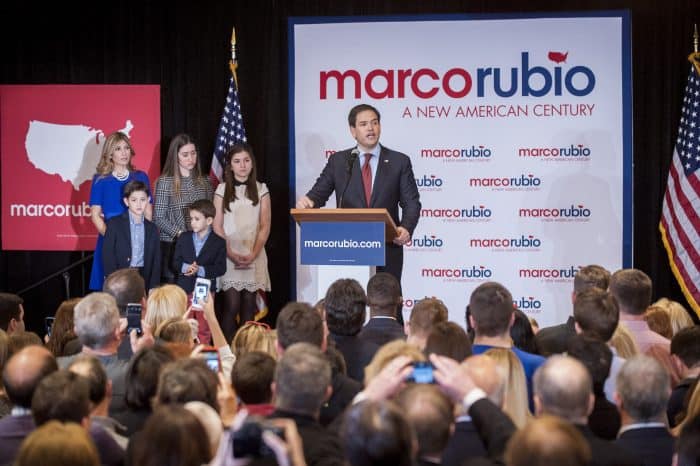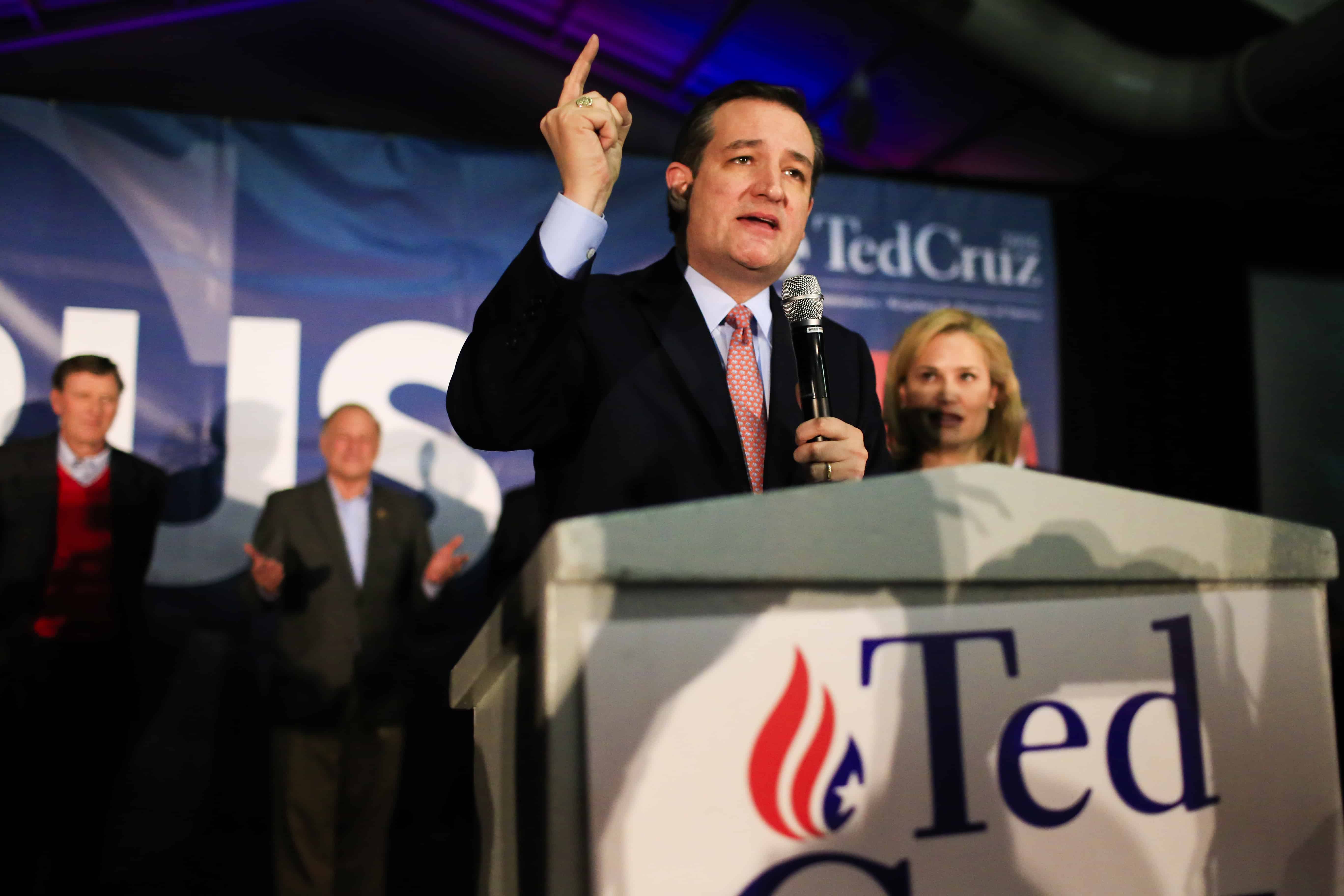DES MOINES, Iowa – U.S. Sen. Ted Cruz of Texas rallied a broad coalition of conservatives around his anti-Washington message to win Iowa’s presidential caucuses here Monday night, edging out Donald Trump in their battle to claim the Republican Party’s outsider mantle.
Riding a late wave of momentum, Sen. Marco Rubio of Florida finished a surprisingly strong third, just behind Trump, which positions him as the leading establishment choice when the campaign moves to friendlier terrain in New Hampshire.
Trump – the brash billionaire mogul whose populist rage and unconventional campaign have upended U.S. politics – fell short in seeking a decisive victory that would have fully validated his unlikely place at the center of the battle for the Republican presidential nomination. He comes under new pressure to win next week’s primary in New Hampshire, where he has long enjoyed a double-digit polling lead.
With nearly all precincts reporting, Cruz led with 28 percent, followed by Trump at 24 percent and Rubio at 23 percent. The remaining eight major candidates were far behind and in single digits. Edison Media Research estimated GOP turnout at 187,000 voters, about 50 percent higher than four years ago.
Cruz was buoyant and overwhelmed as he claimed victory at a large rally of supporters.
“To God be the glory,” he said. “Tonight is a victory for the grass roots. Tonight is a victory for courageous conservatives across Iowa and all across this great nation.”
At a moment of intense voter anger and frustration with Washington’s gridlock, Cruz campaigned proudly as a Beltway lightning rod. He has been a divisive figure since the moment he was sworn into the Senate in 2013, making more enemies than friends, even among his own party’s leadership.
“Iowa has sent notice that the Republican nominee and the next president of the United States will not be chosen by the media, will not be chosen by the Washington establishment, will not be chosen by the lobbyists, but will be chosen by the most incredible, powerful force where all sovereignty resides in our nation – by we the people, the American people,” Cruz said.
For a Republican Party used to anointing the candidate next in line, all of them white men, the success of Cruz and Rubio was a historic departure. Cruz, 45, and Rubio, 44 – both sons of Cuban immigrants serving in their first terms in the Senate – cemented their roles Monday night as serious contenders for the nomination and offered their party hope of broadening its general-election appeal to Latino voters.
Addressing supporters in Des Moines, Rubio sounded a triumphant and optimistic note, saying he could unite the divided Republican Party and lead the charge against the Democrats this fall.
“They told me that we had no chance because my hair wasn’t gray enough and my boots were too high,” Rubio said late Monday. “They told me I needed to wait my turn, that I needed to wait in line. But tonight, tonight here in Iowa the people in this great state sent a very clear message: After seven years of Barack Obama, we are not waiting any longer to take our country back.”

Cruz overcame a nasty barrage of attacks from Trump, Rubio and their allies – as well as steadfast opposition from Iowa’s political and business elite, including the longtime governor, Terry E. Branstad (R) – to unite evangelical Christians, tea party activists, libertarians and other conservatives.
The first nominating contest answered one of the biggest questions looming over the presidential campaign: Would the throngs of Trump fans who have packed gymnasiums and cheered his incendiary commentary participate in the caucuses, Iowa’s time-honored act of democracy?
Not enough did.
Rubio won over many caucus-goers who waited until the final weeks to pick a candidate, according to preliminary network entrance polling. Evangelical voters, who turned out in record numbers, favored Cruz over Trump and Rubio by roughly 10 percentage points after splitting their loyalties in polls over the past month.
It was disappointing showing for Trump, a celebrity who had never before faced the judgment of voters and could not overcome Cruz’s data-driven appeals. Winning the Iowa caucuses affirmed Cruz’s traditional approach to politicking in Iowa. He entered the race as an underdog, but methodically built a web of relationships in all 99 counties and invested early and heavily in a sophisticated organizing program.
Trump, a New York real estate tycoon who became a reality-television star, had hoped that winning Iowa would force the political class to take seriously the prospect of him as the nominee. Though dismissed by some as merely an engaging entertainer, Trump has tried to prove he is the leader of an anti-establishment movement giving voice to the country’s angry and disaffected masses.
Trump hopes to rebound in New Hampshire and then carry his campaign into the South, where he regularly packs arenas with thousands of people.
Trump was atypically magnanimous as he spoke for just four minutes to supporters. He congratulated Cruz and thanked the people of Iowa – even joking that he would return to the Hawkeye State and buy a farm. He vowed to fight on in New Hampshire, predicting that he would be “proclaiming victory” there.
“We will go on to get the Republican nomination,” Trump said, “and we will go on to easily beat Hillary or Bernie or whoever the hell they throw up there.”
The Iowa results should help winnow what has been a sprawling and chaotic Republican field. Eleven major candidates competed in the caucuses, but low single-digit finishes are likely to force some to consider suspending their campaigns.
Former Arkansas governor Mike Huckabee announced Monday night he was suspending his candidacy after finishing with 2 percent of the vote.
Though the Iowa electorate is far from representative of the nation, the caucuses began to bring into focus the kind of candidate Republicans are yearning for as their nominee. Both Trump and Cruz campaigned as disruptive outsiders and vowed to shatter the status quo in Washington.
Cruz rocketed to national prominence soon after his 2012 election to the Senate. In 2013, Cruz’s 21-hour speech on the Senate floor opposing President Obama’s health-care law forced a partial shutdown of the federal government. The move made him a hero to grass-roots conservative activists across the country and set him on a path toward the 2016 campaign.
At boisterous rallies and intimate gatherings alike, Cruz promised to bring the same insurgent energy to the White House. He talked tough on national security and vowed to halt illegal immigration and reverse many of Obama’s achievements, from the health-care law to environmental regulations that he said were strangling small businesses.
A third outsider, retired neurosurgeon Ben Carson, had a considerable following here among grass-roots conservative activists and briefly led the polls until he began to falter under scrutiny of his foreign policy knowledge. Carson finished in fourth place with 9 percent.
At a moment when Republicans are captivated by new stars, two of the candidates who spent the most time campaigning in Iowa, former senator Rick Santorum of Pennsylvania and Huckabee, were unable to replicate the success they had when they won the caucuses in 2012 and 2008, respectively.
Sen. Rand Paul of Kentucky finished a disappointing fifth place with just 5 percent. He failed to fully inherit and expand upon the libertarian base his father, former congressman Ron Paul of Texas, built in his 2008 and 2012 presidential runs. And former technology executive Carly Fiorina could not reignite the promise she showed last fall, ending up with 2 percent.
The results also dealt damaging blows to the White House aspirations of the candidates with the most government experience. New Jersey Gov. Chris Christie and Ohio Gov. John Kasich, who ran on their executive records and policy know-how, each finished with 2 percent.
Meanwhile, former Florida governor Jeb Bush, a son and brother of past presidents, entered the race as the establishment favorite but saw his support dwindle despite extraordinary spending by his campaign and super PAC. He ended in sixth place with 3 percent.
While the top three Iowa finishers move on with fresh momentum, the Feb. 9 New Hampshire primary provides an opening for a fourth candidate to join them as a leading contender.
Bush, Christie and Kasich all hope to do so. Each was in New Hampshire by Monday night to get a head start on campaigning as they search for a jolt to keep their candidacies alive. The establishment candidates are positioned to garner more support from the Granite State’s decidedly more moderate electorate than in Iowa. But the allegiances of mainstream Republicans are divided among the three governors and Rubio.
The Iowa caucuses kicked off what is on track to be the costliest Republican presidential nominating contest ever. Already, at least $325 million has been spent by the GOP candidates and their allied super PACs, according to Federal Election Commission filings and data from the nonpartisan Center for Responsive Politics.The negativity concerned some Republican leaders here and was a marked contrast from the Democratic race, where Hillary Clinton and Bernie Sanders traded softer barbs, mostly on policy differences.
In the final week in Iowa, the race took a decidedly negative turn as the leading candidates and their super PAC allies formed a circular firing squad to discredit one another in the minds of conservative voters.
It sometimes became difficult to sort out who was attacking whom and over what. Trump badgered Cruz with doubts about whether his Canadian birth disqualified him to be president, as well as Cruz’s opposition to federal renewable fuel standards, a top priority for Iowa’s powerful ethanol industry.
Cruz used Trump’s past liberal positions on abortion and gay marriage to portray him as an unprincipled and untrustworthy conservative. He also went after Rubio, using the Floridian’s 2013 role crafting the Senate’s bipartisan immigration reform bill to cast him as a shape-shifter.
Bush’s allied super PAC, Right to Rise, invested heavily in similar attacks on Rubio, while other outside groups aired television ads slamming Cruz and Trump.
It was all punctuated by Trump’s name-calling, as he sought to brand Cruz as a “nasty” person and Bush as “low-energy.”
Jose DelReal in Des Moines and Scott Clement in Washington contributed to this report.
© 2016, The Washington Post








